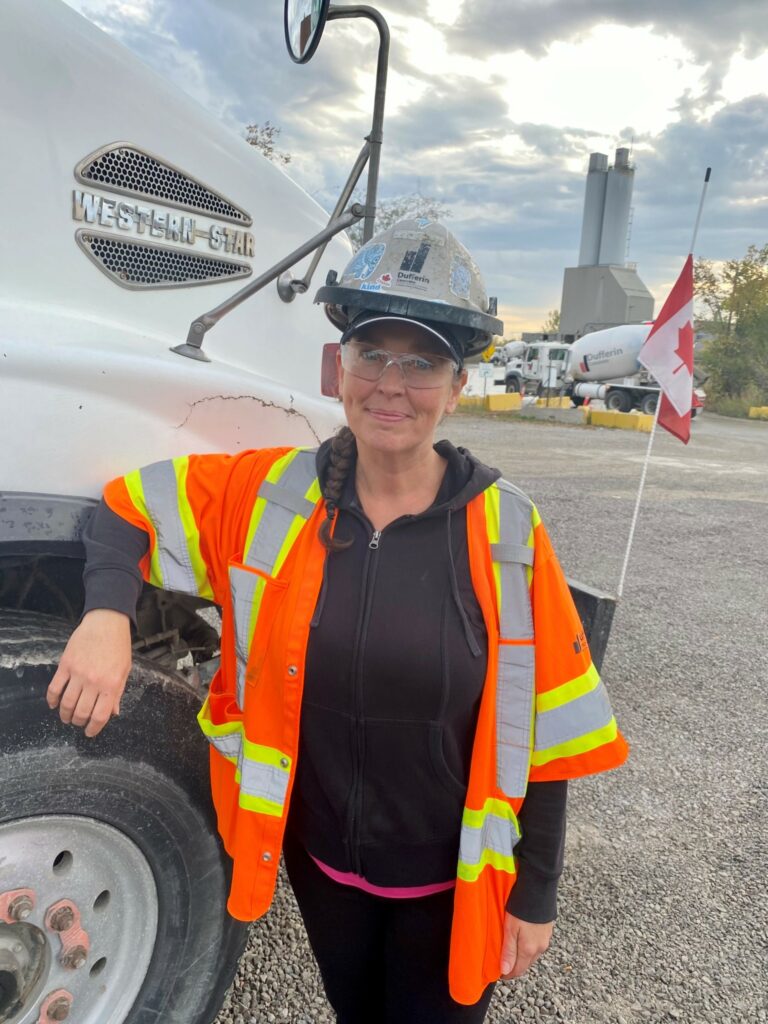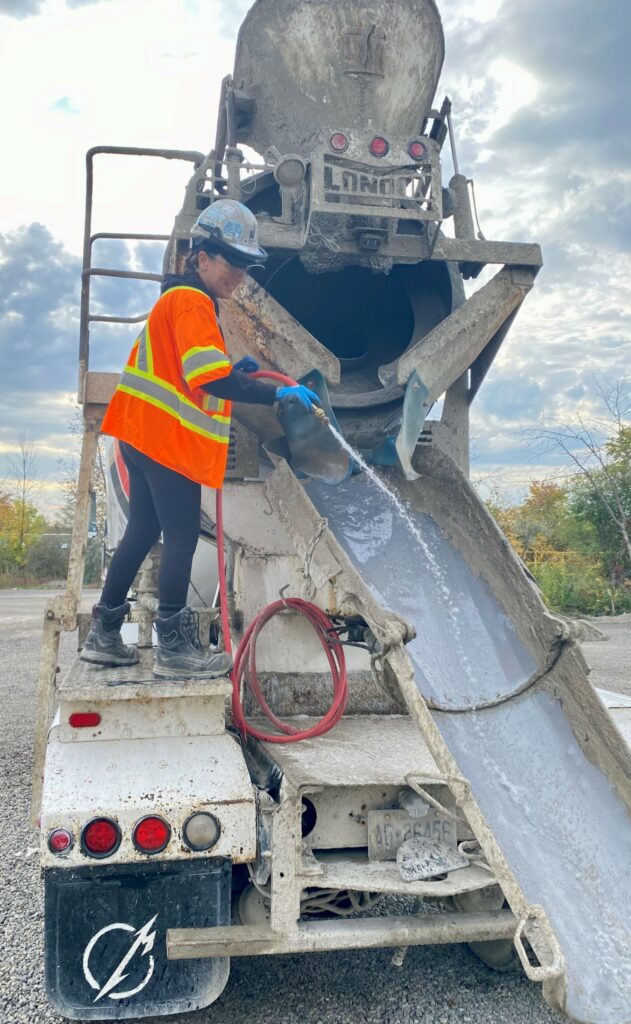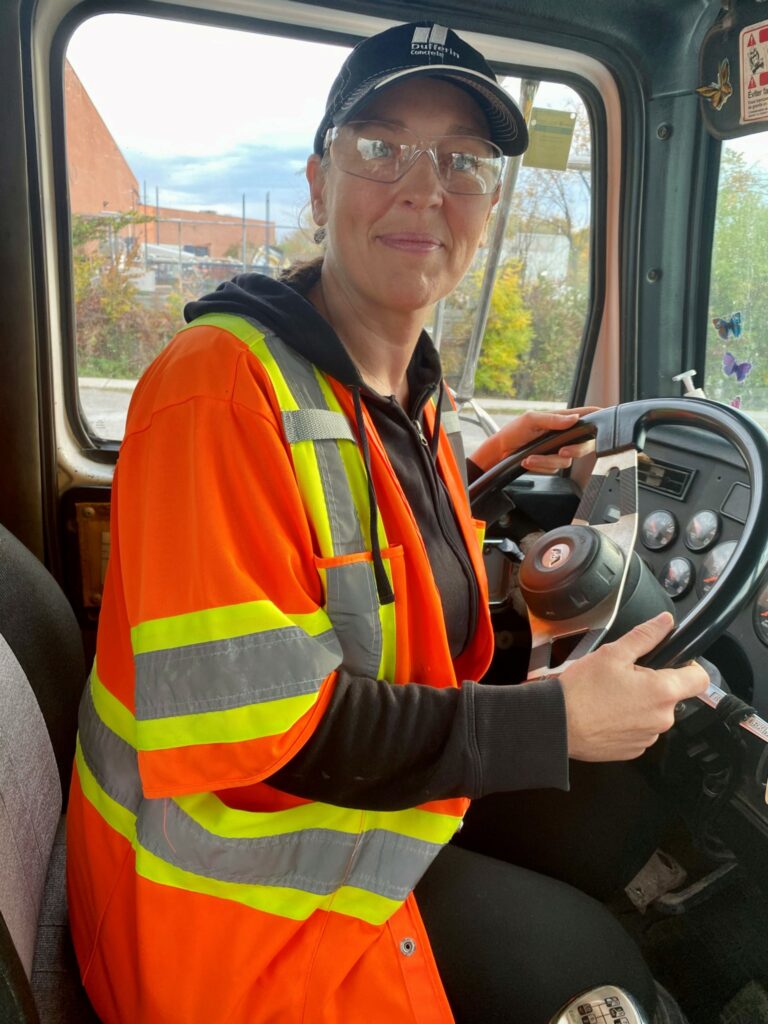De Carvalho makes concrete career choice
How does a woman respond when a guy at a work site tells her she should be ashamed for taking a good job away from a man?
Melissa De Carvalho, a concrete delivery professional, told him to get with the times. She could have complained to his supervisor, but most times she lets her work do the talking. She picks her battles, although she is not shy about expressing herself.
De Carvalho has been driving a truck for Dufferin Concrete for the past eight years. Since the work is seasonal, she operates a snowplow in the winter months and delivers concrete for about nine months.

The driver said the industry still has a lot of issues and there are nasty people who say mean things. She’s here to do her job and earn a living. “If you get wrapped up in the harassment, then you are going to be in the office more than you are working.”
The positive from working with concrete is you are probably not going back to a problematic site again, she said.
Family time is important to the single mother of two girls – aged 12 and 14. She works six days a week in the warmer months, logging 10 to 12 hours a day. “I work hard in the summer so I can spend time with my family in the winter.”
“We only work for our families and have to find the right balance.”
Melissa De Carvalho
In the colder months working as a snowplow operator, she gets standby pay and has to work only when it snows. She can drive her daughters to school, attend their concerts and spend time with them. “We only work for our families and have to find the right balance,” she noted.
De Carvalho got her taste of the trucking industry in the early 2000s when she worked as a dispatcher at a third-party logistics company.
In 2006, De Carvalho and a friend bought two transport trucks to haul steel locally. She began thinking about getting her commercial licence so that she could jump into a truck and take over if one of the drivers didn’t show up. After a while, things did not work out and they had to sell the vehicles.

De Carvalho got her D/Z licence 2008, learning on a bus with an automatic transmission, but could not tear herself from her kids. After splitting with her ex, De Carvalho’s mother moved in to help take care of the girls and she started looking for a driving job.
She began driving a small dump truck delivering and picking up roll-off bins in the winter of 2012. As the company could not provide her with steady work, the owner found her a job with another roll-off bin company.
Training
Here, the female owner provided De Carvalho with training, putting her to work with experienced drivers, where she learned to drive a standard transmission truck.
The hours were still not enough to provide for her family and De Carvalho moved on to a landscape company, hauling a flatbed trailer.
She met a Dufferin Concrete driver at a sendoff party for a former work colleague and he urged her to apply for a job. At the same time, she also applied for a job at a snow-clearing company. She was hired by both organizations in 2014.

A typical day begins between 7 and 8 a.m. at the Mississauga, Ont., concrete plant. She stays as late as she can, hauling extra loads when available.
De Carvalho has been training new drivers for the past five years. “I volunteer for everything, if there is a posting you will see my name on it,” she said.
She puts her early childhood education training from college and experience as a kindergarten teacher to good use when working with new drivers. Her mantra is, “until you do, you will not learn.”
Challenges
The job has its ups and downs. Scheduling is a big issue because drivers don’t have a regular start and end time.
Women face additional challenges. Small job sites do not have washrooms for them. They must strategically use a washroom before leaving the plant or find a public facility, mostly at truck stops or restaurants. “Men go between tires, women can’t do that,” she said.
It is also difficult to find personal protective equipment that fits properly, especially work gloves and boots. As more women enter the industry, De Carvalho foresees things improving.
On the other hand, driving a concrete truck offers a good way to earn a living and De Carvalho always urges others to join the profession. She tells women she meets that if she can do it, so can they.
Physical job
It is a physical job, where drivers are in and out of the truck all day long. Climbing up and down the ladder and moving the chute back and forth in the heat also takes its toll.
De Carvalho puts a positive spin on it. “If I eat right and do this job, I’m getting my workout and money at the same time. It’s a win-win.”
Have your say
This is a moderated forum. Comments will no longer be published unless they are accompanied by a first and last name and a verifiable email address. (Today's Trucking will not publish or share the email address.) Profane language and content deemed to be libelous, racist, or threatening in nature will not be published under any circumstances.
I have a daughter driving a loader for Stella Jones at Carseland AB ,the truck drivers want her to load the poles because she is a professonal.and i am proud of her.
A lot of women drive gravel trucks and transit busses
We can offer a fair wage compared to being a PSWs in that $25 plus / medical then it become a good idea.
Thumbs up Madame De Carvalho !!!